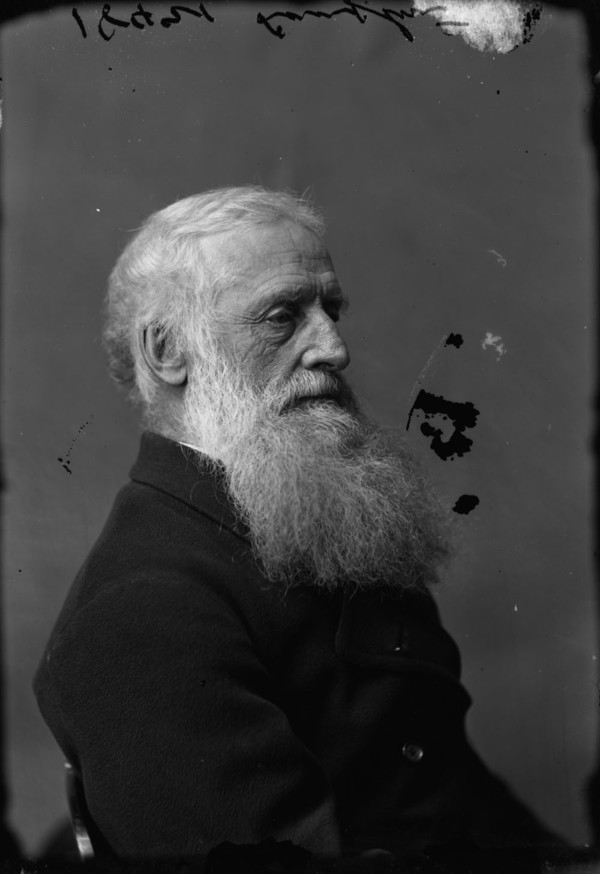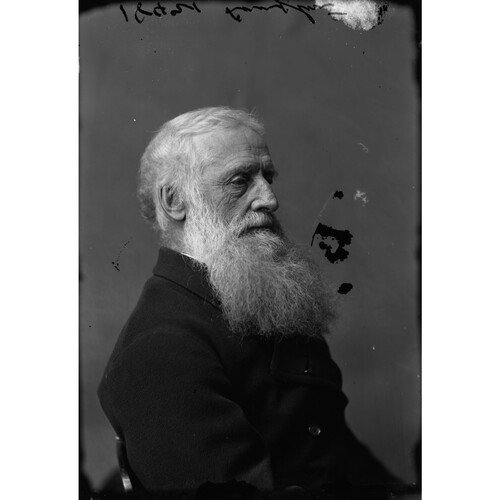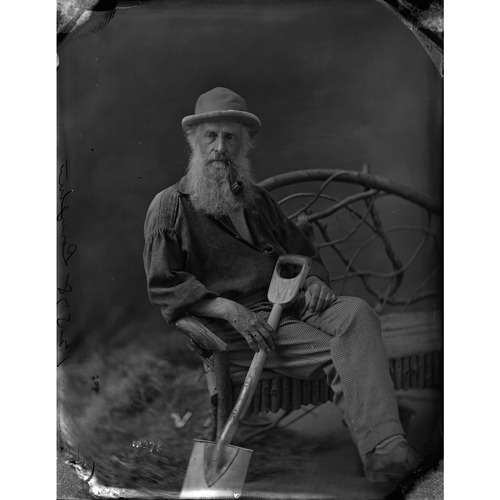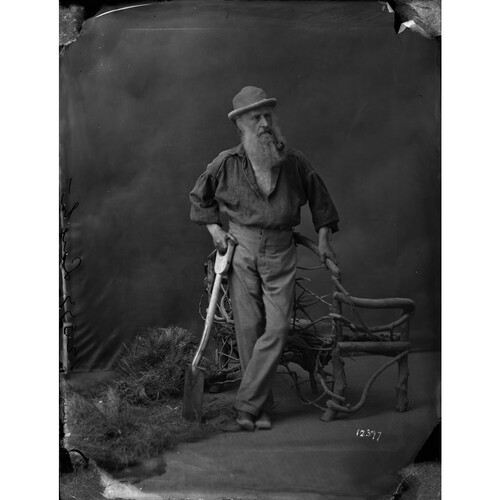LANGTON, JOHN, settler, businessman, politician, and civil servant; b. 7 April 1808 at Blythe Hall, near Ormskirk, England, youngest of four children of Thomas Langton and Ellen Currer; m. 8 May 1845 Lydia Dunsford in Verulam Township, Upper Canada, and they had six sons, including Hugh Hornby*, and two daughters; d. 19 March 1894 in Toronto.
As a child John Langton was described by his father in 1816 as “the most skinny little thing you ever saw, though as full of vivacity as possible and scarce ever moves but with a bound and jerk.” Thomas Langton was a Liverpool merchant who had retired into a silent partnership in a family enterprise, and in 1815 he took his family on an extended European tour. John was enrolled as a part-time student in the famous Swiss school of his father’s friend Johann Heinrich Pestalozzi, but the family was too peripatetic, and perhaps too conservative, for a strong commitment to Pestalozzi’s advanced teaching methods. They relied more often on the conventional tutors of the English communities of Switzerland and Italy.
Business difficulties called Thomas Langton back to England in 1820 and John returned to a school system that he would remember for being devoted mainly to the study of Latin and Greek. In 1826, the year that John went to the University of Cambridge and a year of recession, his father was forced to reach an accommodation with his creditors that avoided the name but was, in fact, a bankruptcy. An aunt saw John, who seems to have been a family favourite, through Cambridge, and money was found in 1833 for him to immigrate to escape his limited prospects at home. Once in Upper Canada he was attracted to the community of British gentlemen settlers forming in the backwoods of Peterborough, among whom were Thomas Alexander Stewart*, Charles Rubidge*, and James Wallis. Langton bought land in Fenelon and Verulam townships and settled on Sturgeon Lake.
Most of Langton’s surviving letters date from his years as a backwoods bachelor. In his correspondence, he proved himself a keen and reflective observer and also a good story-teller, with a humorous turn of phrase which was never to desert him. In 1837 his parents, his aunt, and his sister, Anne, came to join him at the New-World Blythe. With his life there settling into predictable routines, John was torn between an attachment to his farm and frustrated ambition. His marriage to Lydia Dunsford in 1845 added a note of economic urgency. A brief experience in the timber trade, as a partner of Mossom Boyd at Bobcaygeon in 1849 and from 1851 to 1854 as the unsuccessful owner of the Blythe mills (purchased just before his move to Peterborough in 1852), confirmed his distaste for a business career of the backwoods variety. In fact, his talents lay more in the direction of his inclination. As a community leader, he was into everything – and kept the books for everything – from regattas to a subscription in England for the Anglican church in Fenelon Falls. When district councils were established in 1841, he was elected for Fenelon Township, and by 1848 he had been elected warden of the Colborne District. Throughout this time he also worked hard in the conservative political interest. Although he declined when first asked to stand for election to the provincial legislature in the 1840s, he ran successfully for Peterborough in 1851 and again in 1854.
In the Legislative Assembly, as on district council, Langton concerned himself with finance. He established a reputation as a critic of the public accounts, which he described in a speech in November 1854 as existing in a “more curiously complicated state” than those of any country he knew. The cursory audits by the inspector general and the Executive Council had been under attack for years, notably by William Lyon Mackenzie*, and Attorney General John A. Macdonald was himself anxious to see greater control asserted. Perhaps because he recognized Langton’s quickness or saw in his suggestions the possibility of effective action, he had him appointed chairman of the new Board of Audit created in 1855.
Moving to Toronto, Langton assumed his duties in October 1855 and was formally appointed on 27 December. As a civil servant, he was prevented from speaking in public once he resigned his seat on 15 Feb. 1856. His priorities, however, were already on record and he continued to discuss them in private correspondence with his banker-brother, William. He sought to bring the accounts to a form that would reflect current expenditure as closely as possible and enable parliament to pass estimates based on accurate knowledge of the previous year’s revenue and spending. To this same end he tried to prevent the departments from anticipating the legislature by spending money that had yet to be authorized.
Powerful ministers, such as Joseph-Édouard Cauchon* of Crown Lands, resented and resisted his efforts to assert parliamentary control over spending in their departments. With lukewarm support at best from his own chief, Inspector General William Cayley*, Langton proceeded slowly at first in carrying out his audit. It took him several years before his office gained full access to the accounts of all departments and an acceptance of his audit as a routine part of government. In the interim, he had time on his hands and he used it to pursue an interest in higher education and to take on minor posts, such as inspector of prisons, to supplement his income.
Appointed to the senate of the University of Toronto late in 1855, he served as vice-chancellor (1856–60) and presided over the building of University College (1856–59) [see Frederic William Cumberland*]. He joined with Professor Daniel Wilson in 1860 in defending, before a parliamentary committee, the university’s claim to an exclusive right to government financial support, which Egerton Ryerson* and others were challenging on behalf of the denominational colleges. After Langton moved with the government to Quebec in 1859, he proved an active contributor to and president of the Literary and Historical Society of Quebec.
The year 1866 found Langton in Ottawa preparing for confederation. The work of the audit was by now well accepted and he was studying how best to arrange the accounts of the dominion. As its arbitrator, he worked with the colonial finance ministers in negotiating the transfer of accounts in areas of federal responsibility. He also devoted much time to the formidable problem of how to apportion the debt of the old Province of Canada between the dominion, Ontario, and Quebec. A revenue and audit act passed in December 1867 established a federal Board of Audit and Langton was formally appointed auditor in May.
Increased responsibilities followed – as a member of the Civil Service Commission and secretary to the Treasury Board in 1868 and, most significantly, as deputy minister of finance from 1870. The last appointment brought Langton into close association with the government he was supposed to monitor as auditor, a mistake which was tacitly acknowledged when the two offices were separated in 1878. Langton was retired as part of that reorganization. Although he was given a generous pension, he left office under a cloud, scolded by a parliamentary committee for having sanctioned a misuse of the secret-service fund by his old friend Sir John A. Macdonald. In February 1879, shortly after Langton had moved back to Toronto, Daniel Wilson remarked that he was “still wonderfully vigorous, but the old fire is gone.” In 1880–82 he was president of the Canadian Institute.
Langton’s rich and varied background served his adopted country well. In the bustle of the pre-confederation years, not the least of his contributions was the broad sweep of his interests and the time he took to reflect on the larger implications of his work. Under Langton the accounting practices of the new dominion were given a foundation based on a close study of British practice and a consistent pursuit of carefully enunciated principles.
Much of John Langton’s Upper Canadian correspondence was published in 1926 as Early days in Upper Canada: letters of John Langton from the backwoods of Upper Canada and the Audit Office of the Province of Canada, ed. W. A. Langton (Toronto).
His role as president of the Literary and Historical Society of Quebec is reflected in opening addresses printed in its Trans.: new ser., 1 (1862–63): 1–20, 2 (1863–64): 1–34, and 3 (1864–65): 1–26. The society also published several articles by him, including “Note on an incident of early Canadian history” and “Early French settlements in America,” 2 (1863–64): 67–74 and 11 (1873–74): 37–59; other of his articles are listed in Morgan, Bibliotheca canadensis.
Two titles relating to the University of Toronto are his Statement made before the committee of the Legislative Assembly, on the University of Toronto, in reply to those of Rev’d Drs. Cook, Green, Stinson and Ryerson (Toronto, 1860), and University question: the statements of John Langton . . . and Professor Daniel Wilson . . . with notes and extracts from the evidence taken before the committee of the Legislative Assembly on the university (Toronto, 1860), the latter written with Daniel Wilson.
The Board of Audit published three of Langton’s works concerning government finances, all of which lack imprint information, but date from about 1867: Arbitration between Ontario and Quebec, Arbitration between Ontario and Quebec [including notes on the statement of affairs], and Report of the Board of Audit upon the doubtful points which arise in the settlement of accounts between the dominion and the several provinces. A related title, published under his own name, is Memorandum on the financial operations of the three years since confederation (9 loose leaves, n.p., [1870]; copy in UTFL); the author’s comments on it to his brother are among the Langton family papers (UTA, B65-0014/004 (12)).
A portrait of John Langton was published in Thomas Langton, Letters of Thomas Langton to Mrs. Thomas Hornby, 1815 to 1818; with portraits, and a notice of his life, [ed. E. J. Philips] (Manchester, Eng., 1900). Another portrait is found in the Langton family papers (B65-0014/004 (18)), and a third, by Edmund Wyly Grier, hangs in the University of Toronto’s University College.
AO, MU 1690–91. Lancashire Record Office (Preston, Eng.), PR 2886/8 (St Peter and St Paul’s Church (Ormskirk), reg. of baptisms), 24 May 1808. NA, RG 19; RG 58, B, 10, minutes for 1855–58, 1866; RG 68, General index, 1841–67. UTA, A70-0005, 1857–61; B65-0014/003-004. York County Surrogate Court (Toronto), nos.9873, 10239 (mfm. at AO). Can., House of Commons, Journals, 1877, app.2; Parl., Sessional papers, 1869, no.19. Debates of the Legislative Assembly of United Canada (Abbott Gibbs et al.), vols.11–12. Anne Langton, A gentlewoman in Upper Canada; the journals of Anne Langton, ed. H. H. Langton (Toronto, 1950; repr. 1967); The story of our family (Manchester, 1881). J. A. Macdonald, The letters of Sir John A. Macdonald, ed. J. K. Johnson and C. B. Stelmack (2v., Ottawa, 1968–69), 1: 236–38. [Egerton] Ryerson, Dr. Ryerson’s reply to the recent pamphlet of Mr. Langton & Dr. Wilson, on the university question, in five letters to the Hon. M. Cameron, M.L.C. . . . (Toronto, 1861); University question: the Rev. Dr. Ryerson’s defence of the Wesleyan petitions . . . in reply to Dr. Wilson and Mr. Langton . . . (Quebec, 1860). The valley of the Trent, ed. and intro. E. C. Guillet (Toronto, 1957). J. E. Hodgetts, Pioneer public service: an administrative history of the united Canadas, 1841–1867 (Toronto, 1955). Peter Smith, Short history of Lathom (Lathom, Eng., 1982). Norman Ward, The public purse: a study in Canadian democracy (Toronto, 1962). H. R. Balls, “John Langton and the Canadian Audit Office,” CHR, 21 (1940): 150–76. P. A. Baskerville, “The pet bank, the local state and the imperial centre, 1850–1864,” Journal of Canadian Studies, 20 (1985–86), no.3: 22–46.
Cite This Article
Wendy Cameron, “LANGTON, JOHN,” in Dictionary of Canadian Biography, vol. 12, University of Toronto/Université Laval, 2003–, accessed January 2, 2026, https://www.biographi.ca/en/bio/langton_john_12E.html.
The citation above shows the format for footnotes and endnotes according to the Chicago manual of style (16th edition). Information to be used in other citation formats:
| Permalink: | https://www.biographi.ca/en/bio/langton_john_12E.html |
| Author of Article: | Wendy Cameron |
| Title of Article: | LANGTON, JOHN |
| Publication Name: | Dictionary of Canadian Biography, vol. 12 |
| Publisher: | University of Toronto/Université Laval |
| Year of publication: | 1990 |
| Year of revision: | 1990 |
| Access Date: | January 2, 2026 |






